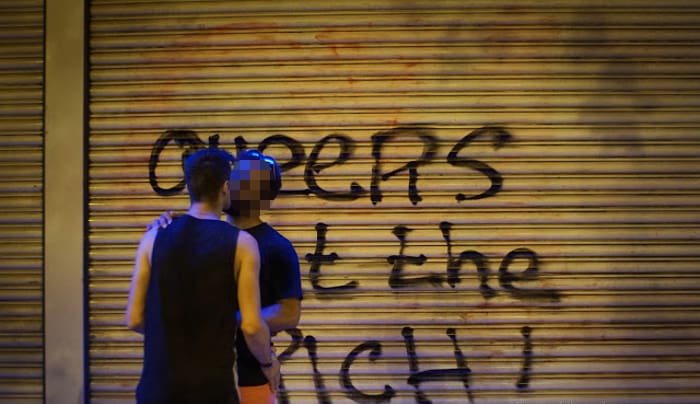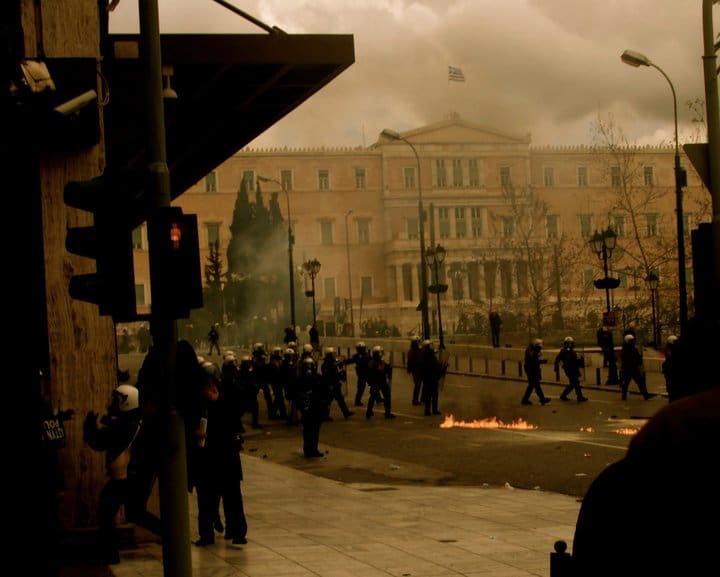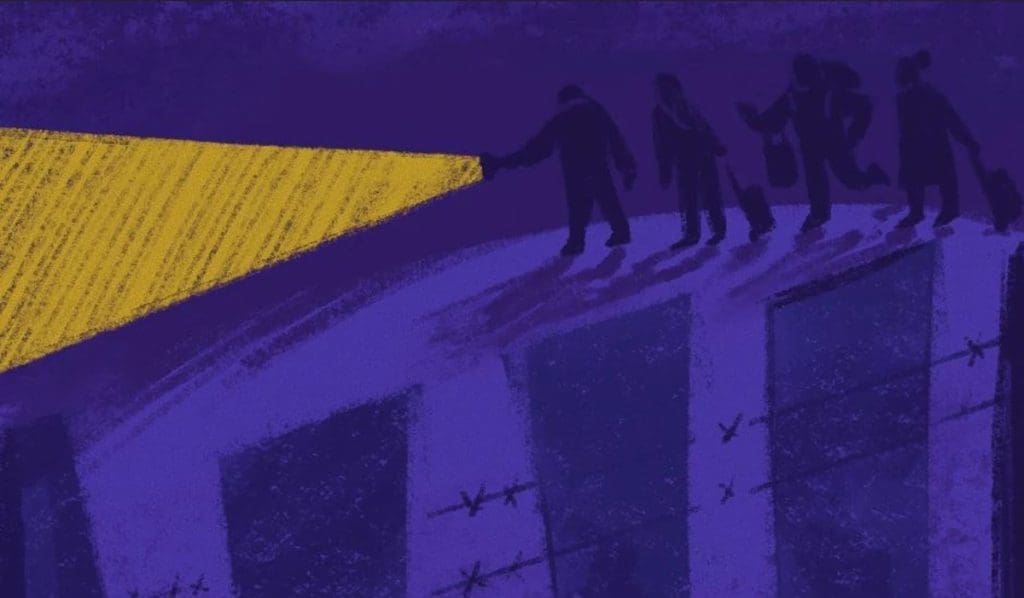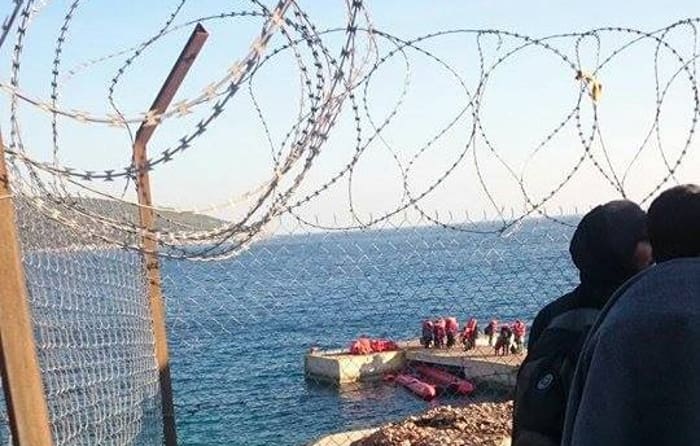Mahaa and Zaman
Testimonies of queer and trans refugees in Greece
by Saad Abdllah and Chris Jones for Samos Chronicles
26 October 2017 (original post)
Note from Samos Chronicles: Saad met Mahaa and Zaman in Athens at meetings of LGBTQ refugees. Their stories below are based on taped conversations and have in places been edited. Their stories, as their lives, continue to unfold in the daily uncertainties facing all the refugees in Greece today.
Mahaa
They told me I had to leave Turkey in two days or I would go to jail.
Mahaa was born and grew up in Basra, Iraq. She is now 25 years old and a trans woman. She was twelve years old when she had her first sexual relationship with a boy. She had no words for this and talked with no one about it. But she knew that she “wanted to be a girl”—and that this was a big problem for her family. So as a teenager she did a lot of physical exercise and body building and developed an amazingly muscular body. She joined the army and went to the army school, where she continued with her gym exercises and sports. She became well known for her fitness. For Mahaa this was her big defense, to make sure no one saw her as a sissy and no one would think of her in this way.
She worked part time outside of school and held a responsible administrative job for the army based in the city. Mahaa describes this as a good time in her life, as she kept her feminine side completely hidden. She liked her job, was passing her diploma exams at the army school, and at the same time was building a private life where she could be herself.
All this changed dramatically when she lost her phone. She searched everywhere: at home, in the office, in the car, on the street, but with no success. The following day she was back in the office when one of the other soldiers came to her desk, saluted as normal, and said that her superior officer wanted to see her immediately in his office.
“Even before I had finished my salute, my superior was saying that he couldn’t believe it; how was it possible that I could hide myself like this?” He then showed Mahaa the photos from her phone which he had printed on a sheet of paper. They showed Mahaa in women’s clothes, and also with her boyfriend. Some showed them kissing. Just romantic pictures. No pornography.
Mahaa was taken directly to the prison, where she was held for three months. They asked many questions about how she got into the army. “They said, ‘It is not possible for gay men to pass the entrance tests and get into the army! Who helped you? Who inside looked out for you? How did you come to the office for three years and no one saw you?’” Mahaa recalls. “Many, many questions like this.”
“I am just normal,” she told them, “I live a quiet life on my own. All the romance with my friend was in private and never in public. I had no other gay friends. No one helped me hide anything. I passed all my tests and my diploma by my own work.”
After three months of solitary confinement, Mahaa was taken to a general prison for one year and one month. They then took her to the court and told her she could go free but that she would lose everything connected with her previous work. Obviously the job was gone, but all her achievements and awards would be wiped from the record as well. “I lost everything.”
But coming out of the prison was when Mahaa’s problems really began to escalate. With nowhere to live, she returned to her family who had already been informed that she had been in prison. It was here that her three uncles and their sons came with knives and bars, beat her senseless in a locked room, and left her to die (her father had died many years earlier, which is why the uncles came). Neither her mother nor her brothers and sisters tried to stop the beating. They just cried. But once the uncles had left, her terrified twin sister unlocked the room and took Mahaa out to the front of the house, where she called Mahaa’s boyfriend. He came immediately and took her to a friend’s house.
These were very hard days. Mahaa was injured (her body is still full of the scars), and she knew her family had enough money to pay people to find and kill them both. When Mahaa’s boyfriend survived an assassination attempt, they decided once and for all that they had to leave Iraq. He took her to Jordan, where she stayed for three months. “But I was never relaxed there. Many of the people there were just like those I saw in Iraq. I didn’t feel safe and I couldn’t find work. I did not call myself trans at this time. I didn’t know what it meant. I just knew I wanted to be a girl. But Jordan did give me the chance to get some nice clothes after all those years in prison and army uniforms.”
Mahaa then met a Jordanian gay friend who helped a lot with her hair and eyebrows as well as clothes and make up. Much of this was new to Mahaa. But this friend was clear that Jordan was not a good country for her and that she would never find safety there to live her life.
So she moved on to Lebanon, staying there ultimately for seven months. But it was very difficult for her, because it was expensive and the money she was sent by her boyfriend was not enough. “He is a very good man and he came to visit me, but he is also responsible for caring for his mother, so it is not easy for him to spend time away. At the supermarket near to my home in Lebanon I met a man from Iraq and he came to know my situation. He said I would be much better off in Turkey and that he had some contacts who could help.
“So I left for Istanbul, and for the first time in my life I met other trans people like me. It was amazing for me. I was very happy.” Mahaa stayed with her trans friend for two and a half years and learned a lot from her about hormones, clothes—many things. This friend also introduced her to dancing, and the night clubs where they could make money. “I knew nothing about dance at the beginning but now I know everything!”
But her life was again turned upside down when the Turkish police caught her with her expired visa from Lebanon. “They told me I had to leave Turkey in two days or I would go to jail.”
“I cried all day. I was with my friend Sona. I couldn’t go back to Iraq. I have no contact with my family. I don’t know anything about them and I don’t want to know. My family will never accept me. They never accepted me as a boy and they would never accept me now. I hate my uncles, and my mother who did nothing but cry and never tried to do anything to help me.”
Mahaa’s Move to Europe
Her friend took her first to Izmir, then on to Antalya and from there by boat to the small Greek island of Kastellorizo. After a few days she was taken to the prison in Kos. “All this time they think that I am a girl. I was taken from the prison to a camp and put in a container with other women. I couldn’t accept this, so I went to the head of the UNHCR and told them that I am not a girl but trans. They took me immediately to the chief’s office to stay, and then I was moved to a house on my own. The UNHCR were very kind to me.”
The other refugees in the camp were also kind to her when they thought she was a girl. But when they discovered she was trans many became “like animals, and they wanted to kill me. The best of them just laughed at me.” When she moved out she never went back to the camp. She stayed for one month and ten days. With an open card, she moved to Athens in July 2017.
She does not like Athens, largely because the 150 euros she receives from UNHCR each month is not enough to live on. She is desperate for hormones—“I am losing my breasts”—but has no money. “No one can or will help me. I asked Praksis [an NGO] and I got nothing. I think I can only help myself. There is no one else.”
“But I can’t stay here. The language is too difficult. So I am learning English. I just want to work and be comfortable as a trans person. A little money and a home where I can find safety and a bed. I can’t work in sex. I can’t go back.”
She is very clear that the loss of her phone did not destroy her life. Instead it it changed her life: “I went from being an officer in the army to becoming a trans person.”
“I enjoy being trans and I want this life.”
* * *
Zaman
Do they stare because of my gayness or because I am a refugee?
Zaman is 27 years old and also comes from Basra in Iraq. Zaman grew up with his uncle and aunt, their children, and his grandmother. His mother and father died when he was young. He had no brothers and sisters, although he had cousins. His relationship with his uncle was often strained, but his aunt cared for him as his mother, and they are still very close. His grandmother was also very good to him, and he loved her.
“I knew when I was a child that I liked boys more than girls,” Zaman explains. “I love boys to care for me and to love me. When I was ten, I had sex with a boy. We had no words for that, whether it was wrong or right, but I knew that I loved him.
“I was very feminine when I was young, but not now. When I was around twelve I started to watch dancing on TV and in the movies, and I would dance on my own in my room. My auntie told me that people here would not accept boys doing this type of dancing.
“Around this time, I met a boy who I liked, who told me about making money from sex and dancing. I didn’t like this way, because I wanted to continue with my classes and study. But my family—especially my uncle—did not accept how I was and what I wanted to do, so I started to listen more to this boy. I met many people who wanted to have sex with me, but I knew I had to take money for this because otherwise they would not respect me. They would say I was cheap.”
Then someone—he does not know who—posted a video on the internet of him dancing. His uncle saw it. He was furious, and “attacked me and broke my leg deliberately so I would never be able to dance again.”
“This was the worst time of my life. In the family home, my uncle insisted that I should be given very little of everything—food, clothes. It was impossible, so I decided to move. I will have nothing to do with my uncle.” Zaman moved in with a gay friend and began to earn money from sex and dancing. He was eventually able to get an apartment of his own.
His uncle, in the meantime, left his aunt and remarried. Zaman felt responsible, because his aunt wanted him to come home and his uncle refused. She is always trying to support Zaman, which made her husband very angry. Since the divorce, Zaman sends money back to his aunt when he can.
“I liked dancing, and this work gives me strength.” In the process he met many powerful people. Zaman was close with a dancer from Dubai who told him that he would do very well there. “So I went, and I did make good money, but as a gay person in Dubai I never felt comfortable. So when I heard my sister was ill, I returned to Basra.
“At that time my uncle was still with my aunt, and he refused to let me stay in the family house, so I stayed with a gay friend and his mother. In their neighborhoood there were many mafia people. They saw us together and they didn’t like it. But I loved him very much and these were good times for me.”
Then they murdered his friend.
“These killers said it was me who was the murderer. Before they took me to the police, they beat me. I had no chance. They also had friends in the police, and the judge was also linked to the mafia. I was raped by one of the police during questioning.
“The judge said I had two choices: to stay in prison to avoid being killed by the mafia, or to leave Iraq altogether. So I left my country and went back to Dubai, where life had gotten much more difficult for Iraqi people in the UAE. So I went back to Iraq for six months to see my sister, and then I left for Turkey.
“I had a she-male friend in Istanbul who took me to his house. He said that to survive in Istanbul I would have to have sex everyday. No sex, no money. I then met an Iraqi man who had a night club, and he said it would be better for me to live and work back in Iraq. So I went back again. But it was very difficult. I wasn’t supposed to live inside Iraq. I was very tired by all the stress, and I was very nervous about the police and what might happen if I was caught. It was also a time when my relations with my uncle were very bad.
“Many of my friends said I should go to Europe. The money I made working in the night club made it possible to make the trip.
Zaman’s Move to Europe
When Zaman traveled from Turkey to the Greek island of Chios, he found himself in a six-meter boat with eighty people leaving the Turkish shore. He was terrified. “I thought we would die. But we were caught after ten minutes, and I was very happy. We would live.”
The joy was short-lived. The Turkish police were violent and beat them.
The second time trying to get to Chios was a success. It was 25 May 2017.
“I was very happy to be in Europe. I have heard so many good things about it. And I was also happy because my uncle was now far away and couldn’t catch me.
“I was happy to be in Chios. But the people I came with in the boat knew I was gay, and began saying bad words about me.” UNCHR, as with Mahaa, responded quickly and moved Zaman into a house with his friend Toofaha, who had come to Chios a little while later. “I told them all that had happened to me, including the rape, and they helped me get out of the camp.”
Zaman was on Chios for three months before he was allowed to move to Athens. He didn’t leave Chios immediately, but waited a few weeks for Toofaha to get his papers, and then they traveled to Athens together, where they now share an apartment.
Like many refugees, his first impressions of Athens are mostly negative. The ongoing collapse of the Greek economy and society cannot be avoided. It is everywhere on the streets, with boarded up shops and businesses, and of course no jobs with pay to keep you alive. With only the 150-euro monthly allowance from the UNHCR, life is difficult.
“I have found nothing here. No good job. I don’t like people looking at me when I get dressed up to go out. Do they stare because of my gayness or because I am a refugee? But now I want to wear trans clothes and feel comfortable. This is not the life I want.”
Zaman feels that he is now a very high quality dancer. Wherever he has danced he has been a success, and constantly improving his performance. Many people like his dancing. “I want to be a famous dancer. But I need someone to help me get started again in Europe.”
Edited lightly for clarity by Antidote. Saad Abdllah’s own story, also reprinted from Samos Chronicles, is a highly recommended pairing with this article.
Featured image source: Epoca Libera





